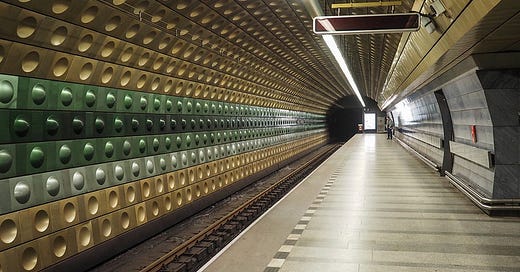[Blank1.]
I should probably tell you about the company that brought young-Toby to Praha. If it didn’t exist, his life would go on very differently, and probably worse.
How has this strange, scrappy, inspiring school come about?
The version young-Toby hears is that the founder, Milena Kelly, went on the national TV station, very soon after the revolution, and even sooner after her return from exile. Sometimes, the way it’s described, she almost drove direct from the airport to the studio. But it was a few days. During a one-to-one interview, Milena announced her intention to set up a private language college. The first in the country.
Over the next fortnight, she received either five or eight thousand letters (this was never clear) in response — from people wanting to learn English. Those are our first students. They could not be keener. They are frantic to learn. It’s something they have secretly wanted for years.
The school was set up in the few months between November 1989 and February 1990.
Milena sat down and, almost as an afterthought, wrote a beginner’s English course from scratch. Our teaching materials have been typed up, interspersed with cartoons clipped from American magazines, and then xeroxed by the hundred. They contain typos, and errors of grammar, and things that no native speaker would ever say in normal conversation, but are still a way of doing something rather than waiting around for someone else (hello, Cambridge English) to do it.
Quite soon, Angličtina Expres (English Quickly) will acquire some computers, and young-Toby will switch from teaching to writing. He’ll write a Business English course. With no experience of business, or of constructing language courses. But this is 1990, and this is the Wild East. If you have the confidence to say you can do something, you can probably do it.
That’s my main memory of this time. That I felt more free, presented with a greater set of possibilities, than ever before and certainly than ever since. Authority, state authority, was completely unsure of its limits. The police were ashamed of being the police, and rightly so. They didn’t want to arrest anyone, if they could possibly avoid it. Spontaneous public gatherings — mini-festivals — happened all the time. People clustered in circles at the top of Wenceslas Square and had passionate political debates (a little like Hyde Park Corner used to be). They would put down their shopping bags and discuss the latest acquisition by a German conglomerate or hunger strike. Big municipal decisions were made very quickly, because there was no time to dwell and very few people to speak up for business as usual. The only way to find out if some mad scheme was do-able or forbidden or impossible was to try it.
In the coming year, Young-Toby will meet recently economics graduates who have become Presidential advisers, because they put themselves up for the job. Sometimes simply because they went to the Presidential offices and introduced themselves. He will encounter confident young men and women who end up presenting programmes on national radio, or founding ex-pat newspapers, or nightclubs, or laundrettes.
Here’s a cartoon version of what happens in 1990-1992: The Americans Abroad, who arrive in numbers a bit later than the Poll Tax Exile Brits, have money to invest. The Brits, for the most part, are happy to be able to afford a second and third beer. They fit in with established structures. They participate and augment. The Brits rent; the Americans buy. Young-Toby doesn’t sense a big French or German presence. Perhaps they are here, but they are quiet and unimaginative. The Americans are unignorable, however. The Americans see business opportunities everywhere.
With Angličtina Expres, Young-Toby is working for an American business, and he’s teaching American English — which is what Czechs want to learn.
Most of all, there’s hope around in the Prague Spring of 1990 — hope, that vague, frangible item; hope because, for most people here, this May is better than last May. People like and trust one another a little more. They feel free to define a greater freedom.
This freedom seems likely to contain much absurdity, because nothing could look more absurd than the seriousness of their recent past.
Greyness rainbows.



